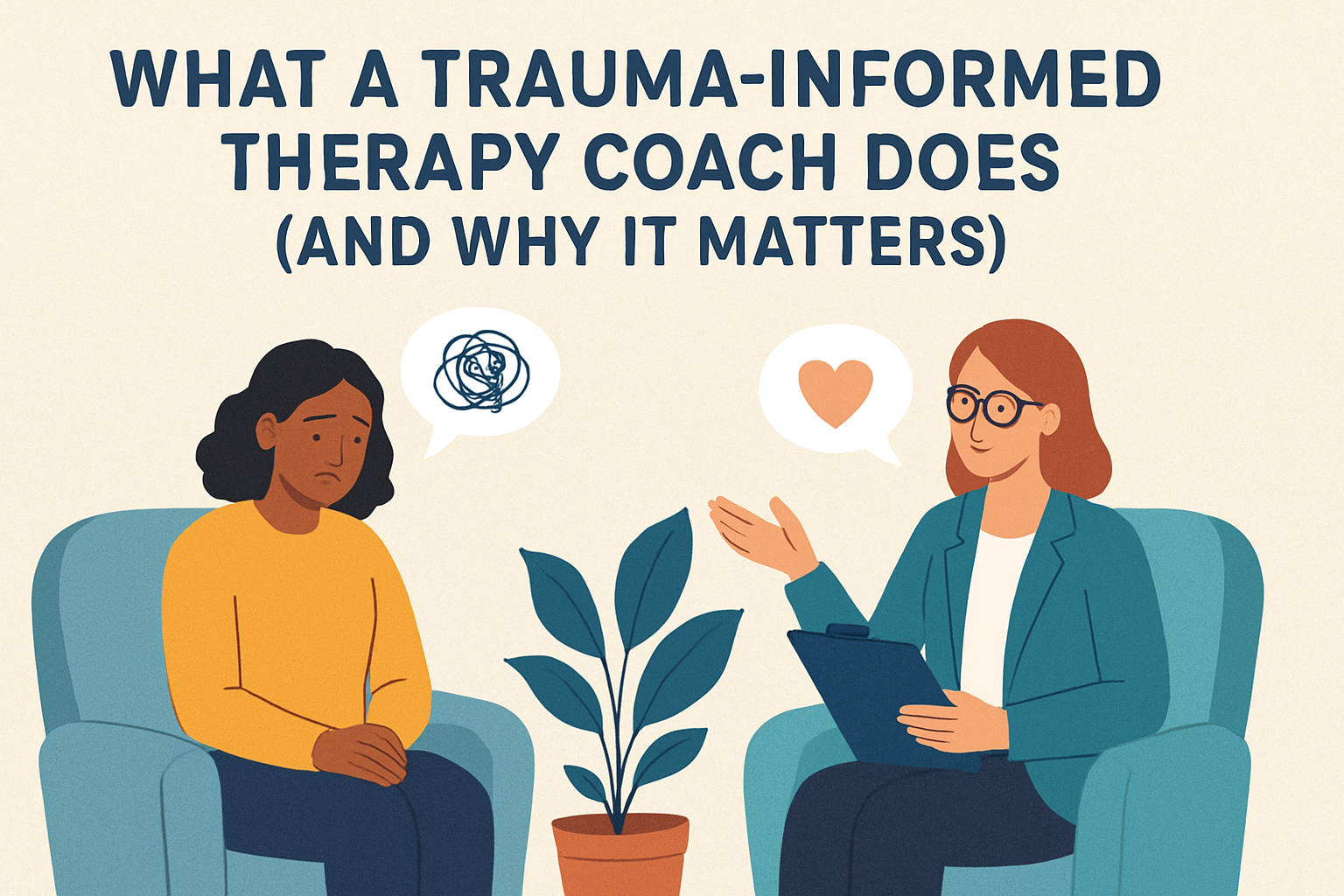Life is full of challenges, some expected and others that hit us unexpectedly.
For many, the effects of trauma linger long after the event has passed.
These experiences—whether from childhood, relationships, work, or unexpected crises—can leave deep emotional scars.
This is where a trauma-informed therapy coach steps in.
Unlike traditional coaching or therapy approaches, trauma-informed coaching is about understanding the roots of emotional pain and guiding clients in a compassionate, safe, and empowering way.
“Trauma is not what happens to us, but what we hold inside in the absence of an empathetic witness.” — Peter Levine
This quote captures the essence of why trauma-informed therapy coaching matters.
It’s not about fixing someone; it’s about walking alongside them, creating a space where healing can begin.
Understanding Trauma-Informed Therapy
Before diving into what a trauma-informed therapy coach does, it’s important to understand what trauma really is.
Trauma is any experience that overwhelms a person’s ability to cope.
It can be a one-time event, like a car accident, or ongoing stress, like emotional abuse or neglect.
The effects can be subtle—like anxiety, low self-esteem, or relationship difficulties—or more pronounced, such as panic attacks, dissociation, or emotional numbness.
A trauma-informed therapy coach is trained to recognize these signs and tailor their approach accordingly.
Unlike some traditional therapeutic models, trauma-informed coaching focuses on safety, trust, empowerment, and collaboration.
The goal isn’t to relive the trauma but to help the individual process it safely, build resilience, and reclaim control over their life.
Key Principles of Trauma-Informed Coaching
Trauma-informed therapy coaches operate on a foundation of understanding and empathy. The following principles guide their work:
- Safety First – Creating a safe environment is paramount. Clients must feel physically and emotionally secure.
- Trust and Transparency – Honesty and clarity in communication help clients feel secure and supported.
- Empowerment – Trauma-informed coaching emphasizes choice and autonomy. Clients are guided, not directed.
- Collaboration – Healing is a partnership. Coaches and clients work together, acknowledging the client’s strengths and knowledge of their own experiences.
- Cultural Sensitivity – Trauma affects everyone differently. Coaches respect each person’s background, identity, and values.
“Empathy is seeing with the eyes of another, listening with the ears of another, and feeling with the heart of another.” — Alfred Adler
This principle of empathy is at the core of trauma-informed coaching.
It’s about meeting people where they are, not where we think they should be.
What a Trauma-Informed Therapy Coach Actually Does
A trauma-informed therapy coach wears many hats.
Their work goes beyond traditional coaching or counseling. Here’s a closer look at what they do:
Assess and Understand Trauma
The first step is understanding the client’s unique experiences.
Trauma-informed therapy coaches conduct careful assessments to identify triggers, patterns, and coping mechanisms.
This isn’t about digging into painful memories unnecessarily.
Instead, it’s about understanding how trauma shows up in a client’s life today—emotionally, mentally, and physically.
Create a Safe Space
Safety is non-negotiable in trauma-informed coaching.
The coach establishes clear boundaries and practices active listening.
Clients are encouraged to share as much or as little as they are comfortable with.
Over time, this safety helps clients build trust not only with the coach but also with themselves.
Teach Coping Skills and Emotional Regulation
Many trauma survivors struggle with intense emotions or stress responses.
A trauma-informed therapy coach helps clients develop healthy coping strategies.
This may include mindfulness exercises, grounding techniques, breathing practices, or journaling.
The aim is to empower clients to manage emotions without being overwhelmed by them.
Support Personal Growth and Resilience
Coaching goes beyond trauma management.
Trauma-informed therapy coaches help clients set goals, explore their strengths, and rebuild confidence.
They focus on what’s possible rather than what’s broken.
Small achievements are celebrated, and setbacks are seen as learning opportunities.
Foster Connection and Self-Compassion
Trauma often isolates individuals.
A coach encourages reconnection with oneself and with others.
Through exercises in self-compassion, empathy, and positive relationship-building, clients learn to navigate life more confidently.
Collaborate with Other Professionals
Sometimes, clients need additional support, such as therapy, medical care, or social services.
Trauma-informed coaches recognize when to refer clients and collaborate with other professionals to ensure holistic care.
Why Trauma-Informed Coaching Matters
The impact of trauma can be far-reaching.
Without support, it can affect relationships, work, physical health, and overall quality of life.
Trauma-informed coaching matters because it addresses these issues with understanding, empathy, and actionable guidance.
- Healing Without Judgment – Clients are met with understanding, not blame.
- Building Resilience – They develop tools to manage triggers and stress.
- Empowering Growth – Coaching focuses on future possibilities, not past pain.
- Strengthening Relationships – Clients learn healthier ways to interact and communicate.
“Trauma doesn’t have to define your life; it can refine it.” — Unknown
This idea is central to trauma-informed coaching.
While trauma may shape experiences, it doesn’t determine the outcome.
With guidance, individuals can reclaim their lives, build meaningful connections, and find purpose.
Who Can Benefit from a Trauma-Informed Therapy Coach?
Trauma-informed therapy coaching is not just for those with severe trauma histories.
Anyone dealing with the lingering effects of stressful experiences can benefit. This includes:
- Survivors of abuse or neglect
- Individuals experiencing grief or loss
- People facing workplace or relationship trauma
- Those struggling with anxiety, depression, or low self-esteem
- Anyone looking to improve emotional resilience and self-awareness
In short, if trauma or past experiences are affecting your ability to thrive, a trauma-informed therapy coach can help guide the way.
How to Choose the Right Trauma-Informed Therapy Coach
Choosing the right coach is essential for effective healing.
Here are some tips:
- Check Credentials – Look for certified trauma-informed professionals with experience in coaching and mental health.
- Experience Matters – Seek coaches who have worked with clients facing similar challenges.
- Trust Your Instincts – Comfort and trust are critical. A coach should feel safe and supportive.
- Ask About Approach – Ensure their methods align with trauma-informed principles like empathy, safety, and collaboration.
The Long-Term Benefits of Trauma-Informed Coaching
Working with a trauma-informed therapy coach can have profound and lasting effects:
- Enhanced emotional awareness and regulation
- Greater self-confidence and autonomy
- Stronger, healthier relationships
- Improved mental and physical well-being
- A sense of empowerment and purpose
Healing is not linear. But with guidance, people can move from a place of survival to one of thriving.
Final Thoughts
Trauma is a part of life, but it doesn’t have to define it.
A trauma-informed therapy coach provides a compassionate guide through the healing journey.
They create safe spaces, teach coping strategies, and help clients reclaim control of their lives.
By emphasizing empathy, empowerment, and collaboration, these coaches make healing not just possible—but sustainable.
If you’ve ever felt weighed down by past experiences or struggled to navigate your emotions, know that help is available.
Trauma-informed coaching is not just about addressing trauma—it’s about rediscovering joy, resilience, and connection.
“Healing takes time, and asking for help is a courageous step.” — Mariska Hargitay
Working with a trauma-informed therapy coach is one of those courageous steps.
It’s a partnership that honors your experiences, values your growth, and helps you find your way to a more empowered life.
FAQs
What is a trauma-informed therapy coach?
A trauma-informed therapy coach is a professional trained to understand how trauma affects your emotions, thoughts, and behavior. They create a safe, supportive environment to help you process experiences, build coping skills, and move forward with confidence.
How is trauma-informed coaching different from regular therapy?
While traditional therapy often focuses on diagnosing and treating mental health conditions, trauma-informed coaching emphasizes safety, empowerment, and practical tools for daily life. It’s more collaborative and focuses on healing from trauma without forcing clients to relive painful memories.
Who can benefit from working with a trauma-informed therapy coach?
Anyone affected by past trauma or overwhelming stress can benefit. This includes survivors of abuse, people facing loss or grief, those struggling with anxiety or low self-esteem, and anyone wanting to improve emotional resilience.
What happens in a trauma-informed coaching session?
Sessions are personalized and client-centered. You’ll work with your coach to explore patterns, identify triggers, and develop coping strategies. Sessions focus on emotional regulation, goal-setting, and building resilience—all in a safe, non-judgmental space.
How long does trauma-informed coaching take?
The length varies depending on your goals and needs. Some clients benefit from a few sessions for specific challenges, while others engage in longer-term coaching to build lasting coping strategies and personal growth.
Can trauma-informed coaching be done online?
Yes! Many trauma-informed therapy coaches offer online sessions. Virtual coaching can be just as effective as in-person sessions, providing flexibility and comfort for clients wherever they are.
How do I choose the right trauma-informed therapy coach?
Look for credentials, experience, and an approach aligned with trauma-informed principles. Most importantly, trust your instincts—your coach should feel safe, supportive, and empathetic.
What results can I expect from trauma-informed coaching?
With consistent coaching, many clients notice improved emotional awareness, better coping skills, stronger relationships, and a greater sense of self-confidence. Over time, trauma-informed coaching can help you move from simply surviving to truly thriving in your daily life.





